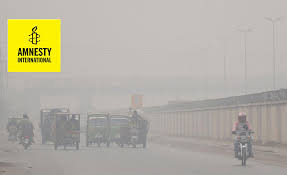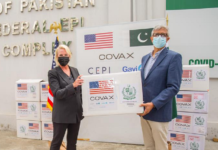By Muhammad Luqman
World,s leading human rights group, Amnesty International has urged its supporters to speak out on behalf of the residents of Lahore, where hazardous smog is putting thousands of lives at risk.
Pakistan’s second-largest city with a population of 11 million has not had a single day of healthy air this year, the rights group claims.
“The government’s inadequate response to the smog in Lahore raises significant human rights concerns,” Rimmel Mohydin, South Asia Campaigner at Amnesty International, said in a statement. “The hazardous air is putting everyone’s right to health at risk.”
It is the first time Amnesty International has issued an “urgent action” call on behalf of the entire population of a major city. The campaign tool is meant to mobilize supporters around the world amid imminent danger of human rights violations.
Pakistan’s eastern city located very close to international border with India experienced worst smog conditions first time in November 2016 after the easterly winds from Indian state of Punjab brought all the toxic air produced mainly due to burning of paddy crop stubbles.
Since then, the last week of October and entire month of November have several smoggy days.
This year, the worst smog was witnessed on November 6 when the wind pattern turned from east to west.
Lahore like Indian capital, New Delhi is often considered one of the world’s most polluted cities. This month, people have been forced to stay indoors as the air quality was classified as “hazardous” one of every two days by the U.S. Consulate in Lahore’s Air Quality Monitor Feed. Prolonged or heavy exposure to hazardous air can result in severe health issues including asthma, lung damage, bronchial infections, heart problems and shortened life expectancy, Amnesty says.
“The issue is so serious that we are calling on our members around the world to write to the Pakistani authorities to tell them to stop downplaying the crisis and take urgent action to protect people’s health and lives,” Mohydin said.
Pakistan’s Punjab province has banned the burning of crop residue besides shutting down brick kilns but smoggy conditions still persist.
According to the government’s Punjab Clean Air Action Plan, Lahore experiences 10 to 25 days low visibility from November to February each year due to smog, haze, smoke and fog. The study acknowledges local sources of pollution, but attributes the recent worsening air quality to “the burning of rice stubbles in the Indian states of Punjab, Haryana and Uttar Pradesh.”
Other cities in South Asia have faced similar problems in recent weeks. Officials in Delhi declared a public health emergency earlier this month due the the smog shrouding India’s capital city.
The World Bank estimates that outdoor air pollution accounts for 22,000 premature adult deaths each year in Pakistan.














